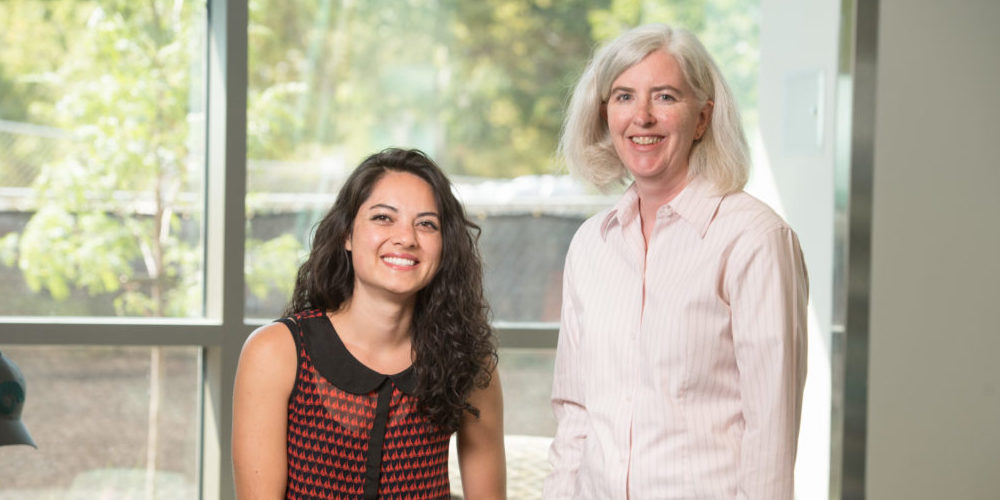
The Women and Gender Collaborative is providing a two-year grant for a faculty-student mentoring program designed to encourage women to pursue advanced STEM careers and follow a path to become future leaders in their disciplines. The project, “Research Mentoring to Advance Inclusivity in STEM” (RMAIS), will span 23 departments within CSU’s eight colleges and is being administered through the Graduate Degree Program in Ecology (GDPE). RMAIS was the sole recipient in the Collaborative’s 2017 competitive grant round.
Cori Wong, director of the Collaborative, says RMAIS stood out as being worthy of receiving the entirety of the Collaborative’s grant funding this year due to the program’s innovative design around the intersection of CSU, STEM and gender. “This project will implement structural changes by incorporating explicit attention to gender and efforts to mitigate against gender disparities in STEM at multiple levels,” said Wong. “We anticipate that this mentoring program will serve as a model for other programs across the University for improving the culture and climate around gender.”
The project also is the first of the Collaborative’s funded programs to emphasize and support research done by those at various stages of their academic and professional careers by involving faculty and students at the undergraduate and graduate levels. RMAIS will develop a framework and materials for mentoring students engaged in research and provide long-lasting resources for student research mentoring at CSU.
Project: ambitious, high impact
Colleen Webb, director of the Graduate Degree Program in Ecology and professor in the Department of Biology with a joint appointment in Mathematics, says RMAIS is an ambitious project, but dovetails well within existing infrastructure. “GDPE is an ideal unit in which to develop mentoring resources for campus around STEM and gender because it consists of approximately 165 faculty and 160 graduate students spanning 23 departments,” says Webb. “This type of broad academic participation ensures that developed resources will be robust and the potential for knowledge sharing to the broader CSU STEM community will be high.”
The primary components of the RMAIS project are as follows:
- A graduate-level seminar on gender and ethnicity in science during the fall semester. RMAIS also will jointly host a guest speaker with Women in Natural Sciences, and an invite will be extended to the general CSU community.
- In the summer, the program will fund approximately six graduate students per year to work in research triads or teams of undergraduate researchers, graduate students and a faculty mentor. This multi-tiered model provides graduate students the opportunity to work under advisors in their field, while undergraduate students have the mentorship of the graduate students and exposure to research. The research triads will also produce modules to provide information about advancing gender equity in STEM, which will be implemented and refined during a summer research seminar for undergraduate and graduate students and then made available as resources for future students and the entire campus community. Matching funds for research triads will be provided by the Graduate School and the Office of the Vice Provost for Undergraduate Affairs.
- The GDPE graduate students will then run a workshop at the Front Range Student Ecology Symposium, where they plan to present their findings from the program to the academic community.
Reversing a national trend
Another goal of the project is to help reverse a national trend of women who don’t pursue advanced STEM careers despite receiving STEM degrees. According to the National Science Foundation, women make up half or more of bachelors and graduate degree recipients across STEM disciplines, but the numbers drop significantly to 30-40 percent when it comes to postdoctoral work. This drives a national decreasing trend in the percent of women in advanced STEM careers and STEM leadership roles.
“This trend impacts the earning potential of women and their potential influence on their disciplines,” says Webb. “Although explanations for the decline in the participation of women in STEM with career advancement vary, studies suggest that mentoring may help ameliorate multiple contributing factors.”
Wong says the project is an example of how effective leadership by Webb and others at CSU can intentionally maximize opportunities for structural changes to advance gender equity. “Rather than simply adding on a separate program for women by women, the GDPE program seeks to holistically incorporate a gendered lens and promote opportunities for everyone – men and women, students and faculty – to become more educated and engaged with advancing women in STEM.”
